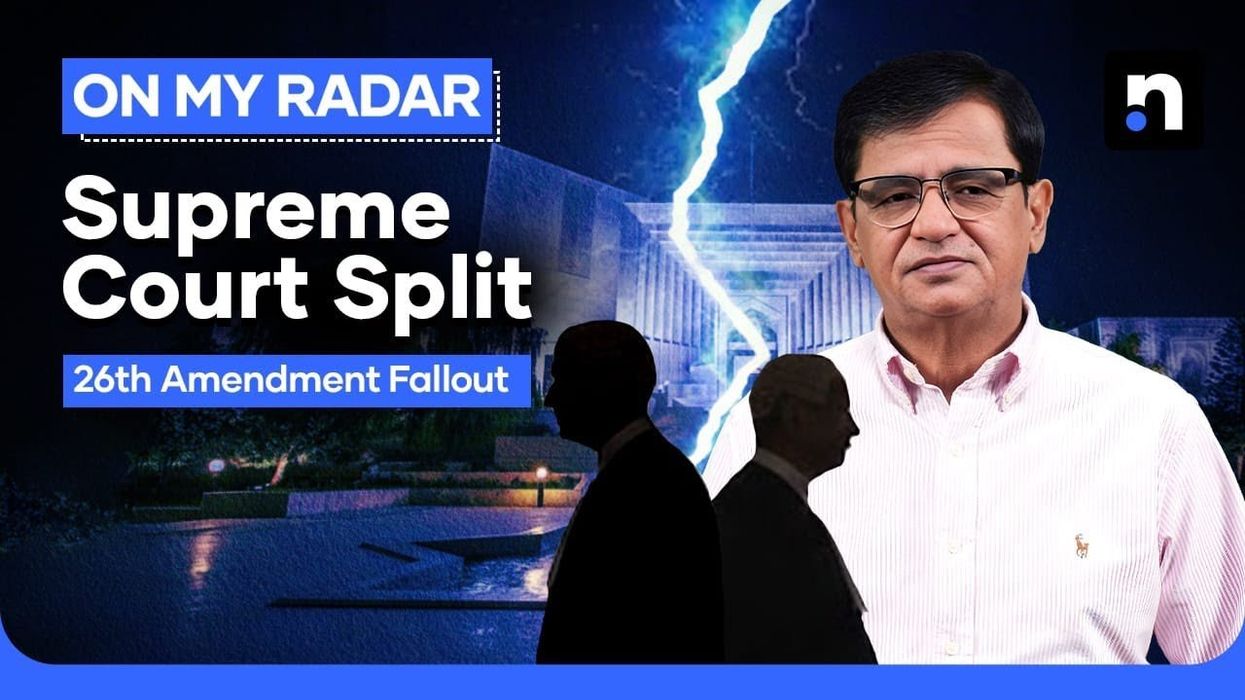Pakistan’s judiciary faces deep divide over 26th amendment
Kamran Khan says the 26th constitutional amendment has fueled debate over judicial independence and executive control
News Desk
The News Desk provides timely and factual coverage of national and international events, with an emphasis on accuracy and clarity.
Pakistan’s judiciary is facing one of its most serious internal divisions in years following sweeping constitutional changes brought by the 26th amendment, which has redrawn the judicial system and sparked competing interpretations within the Supreme Court, according to Kamran Khan.
Kamran Khan, in the latest episode of “On My Radar,” says Pakistan’s higher judiciary is grappling with a major internal rift, as two parallel structures — a 24-member Supreme Court and a 13-member constitutional bench — now operate under separate heads. Chief Justice Yahya Afridi leads the Supreme Court, while Justice Aminuddin Khan presides over the constitutional bench.
While both judges are seen as professional and aligned with the state’s legal framework, several senior justices, including Justice Mansoor Ali Shah and Justice Munib Akhtar, have voiced differing views on constitutional interpretation.
Khan notes that since the passage of the 26th amendment last year, all constitutional cases now fall under the jurisdiction of the constitutional bench, where judges holding dissenting opinions appear to be in the minority.
The amendment, passed in a surprise pre-dawn session of the National Assembly on Oct. 21 last year, introduced 27 changes to Pakistan’s Constitution with support from the PML-N, PPP, and allied parties. Only a handful of lawmakers from the PTI and JUI-F opposed it.
“When citizens woke up that morning, they found the Constitution had been rewritten overnight,” Khan said.
Among the major changes, the 26th amendment transferred the authority to appoint the chief justice from seniority to a 12-member parliamentary committee, which can choose any of the three senior-most judges for a three-year term. The chief justice’s suo motu powers were abolished, and constitutional cases can now be heard only by designated constitutional benches.
Other provisions bar courts from challenging the advice of the president, prime minister, or cabinet and allow the transfer of cases between high courts or to the Supreme Court. High court judges’ promotions are now based on performance and evaluation by the Judicial Commission of Pakistan (JCP).
Kamran Khan says these changes effectively transformed Pakistan’s judicial system and altered its balance of power.
The amendment’s timing also raised eyebrows. It was passed just four days before the retirement of former Chief Justice Qazi Faez Isa — a move that cleared the way for Justice Yahya Afridi, then third in seniority, to become chief justice.
Since then, 36 petitions have been filed against the amendment by bar associations, former judges, civil society members, and the Pakistan Tehreek-e-Insaf. Petitioners argue the amendment undermines judicial independence and subordinates the judiciary to the executive branch.
Prominent lawyers including Hamid Khan, Muneer A. Malik, Akram Sheikh, Abid Zuberi, and Attorney General Mansoor Usman Awan are leading the arguments. The petitioners contend the amendment violates the separation of powers and was not passed after proper parliamentary debate as required under Article 239.
They are demanding that the court strike down the entire amendment or at least the clauses dealing with the appointment of the chief justice and reconstitution of the Judicial Commission.
Kamran Khan says the constitutional bench headed by Justice Aminuddin Khan — comprising Justices Jamal Mandokhail, Muhammad Ali Mazhar, Ayesha Malik, Hassan Azhar Rizvi, Musarrat Hilali, Naeem Akhtar Afghan, and Shahid Bilal — has been hearing these petitions. Heated exchanges and sharp remarks during recent hearings have revived perceptions of tension within the judiciary.
Senior judges Mansoor Ali Shah and Munib Akhtar have reportedly written several letters urging Chief Justice Afridi to form a full court to hear the petitions, but the majority decided the case falls under the constitutional bench’s domain. After a long pause, the bench resumed hearings this month.
“Even though today’s Supreme Court lacks the fiery activism of the past, it’s clear that the 26th amendment has split the judiciary into two schools of thought,” Khan said. “One resists executive dominance, while the other leans toward unconditional cooperation.”
Khan concludes that this judicial polarization, coming amid Pakistan’s intense geopolitical and security challenges, is a reminder that some of the country’s most critical internal matters have quietly moved to the background.











Comments
See what people are discussing